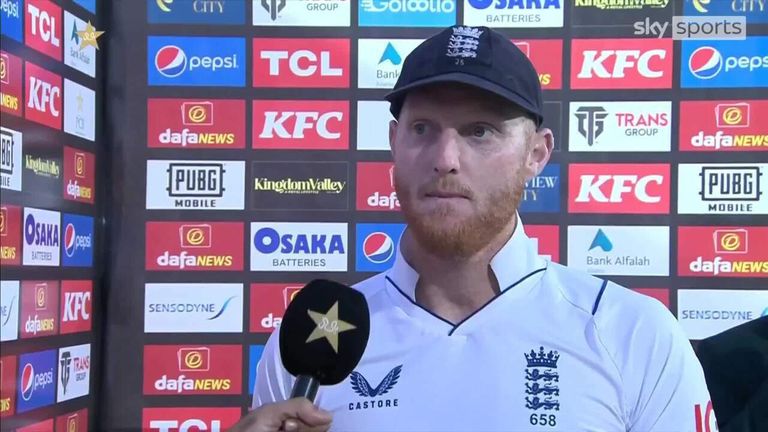A great many column inches have been devoted to England’s brave, bold new approach to Test cricket since its namesake Brendon McCullum arrived as head coach in June.
‘Bazball’ took hold of exuberant home crowds in the summer as run-chases of 277, 299 and 296 were knocked off with consummate ease in successive matches against New Zealand, before an England-record 378 reeled in to beat India.
On the evidence of the five exhilarating days of Test cricket in Pakistan – and on the most benign of pitches, too – England and McCullum’s alliance wasn’t merely a summer fling.
In both innings with the bat, the visitors scored at an unprecedented rate of more than a run a ball (6.50 in the first innings, 7.36 in the second).
It was the first time in Test history that over 500 runs were scored on Day One of a Test, with four England batters compiling centuries – Zak Crawley, Ben Duckett, Ollie Pope and Harry Brook – in another opening-day first.
But this is not another piece extolling the virtues of England’s new, aggressive approach to their batting. No, ‘Bazball’ is prevalent in every single positive step forward this team makes.
So far on this tour, at every possible juncture, in every decision and every facet of the game, we’ve seen England take the positive option.
Let’s start with the make-up of this Test-match-winning team. Firstly, they fielded two debutants in Will Jacks and Liam Livingstone… both white-ball specialists, and with one – the latter – having not played any red-ball cricket for 15 months.
England’s selections in the longest format of the game have, for so long, been safe – favouring experience over raw talent, sticking with the tried and tested or, sometimes even, ‘re-tried’ – but the inclusion of Jacks and Livingstone, with an 18-year-old leg-spinner, Rehan Ahmed, now primed to possibly take the injured Livingstone’s spot in the second Test, it only serves to highlight the shift in approach.
Declarations. England were left sweating on the fifth and final evening in Rawalpindi over one remaining Pakistan wicket as dusk settled in, but even if Jack Leach hadn’t delivered the decisive blow with roughly 10 minutes of play remaining, it wouldn’t have been for the want of trying.
Through the boldest of captaincy calls and, to repeat, on the flattest of pitches, England granted Pakistan an enticing 100-plus overs to attempt to chase down 343 – on the very same surface the hosts had scored 579 on in the first innings and that England had smacked the ball to all corners on.
It is tradition for journalists and former players alike to push for bolder, braver declarations from those out there on the field, and be critical when, instead, a more timid approach is taken to ensure that one result – defeat – is taken out of the game.
It’s easy to pass such judgement without fear of recrimination, repercussion. For Ben Stokes to do so, to truly ‘risk losing for a better chance of winning’ and not just spout it as rhetoric, took guts the likes of which he is not only renowned but that were further on display in the way he both skippered his side following that declaration and led from the front with his tireless spells of bowling.
For Sky Sports’ Nasser Hussain, Test cricket leadership has never been done better.
“You think you have seen everything in this game – until you see the last five days,” Hussain said after England’s 74-run win, just their third ever in Pakistan, and first since he famously led England to victory in the dark of Karachi in 2000.
“There was no reason at all on that featherbed of a pitch that there should have been a result, so I think it was the best bit of Test cricket captaincy I have ever seen to get 20 wickets. I do not think I have seen a better week of captaincy.”
He added: “England had to get everything right and they had to walk the walk after talking the talk and saying they weren’t playing for draws.
“Stokes and [head coach Brendon] McCullum are getting people’s eyes on Test cricket. They have changed the mindset of this England side and this era is changing the face of Test cricket.”
It was a point made at McCullum’s very first press conference in the summer. This bold new style of play was about more than a few home Test wins in the summer, as impressive as they were, nor a series-opening win in Pakistan, as sensational as it was.
McCullum said at the time: “Test cricket needs England to be strong, competitive and playing a watchable style of cricket. If not, it is in big trouble.
“I think Test cricket has been on a slightly downward path and the only people who can change that really are England. The appreciation of Test cricket in this part of the world, the history.
“They have a real opportunity to make significant change and hopefully inspire the next generation of cricketers to want to play Test cricket rather than just T20 or the shorter forms of the game.”
Job done. And bring on the second Test.
What’s next?
The second Test takes place in Multan from Friday (build-up starts at 4.30am on Sky Sports Cricket and Sky Sports Main Event ahead of the first ball at 5am) with Pakistan looking to level up the series ahead of the final fixture in Karachi from December 17, which is also live on Sky Sports.






